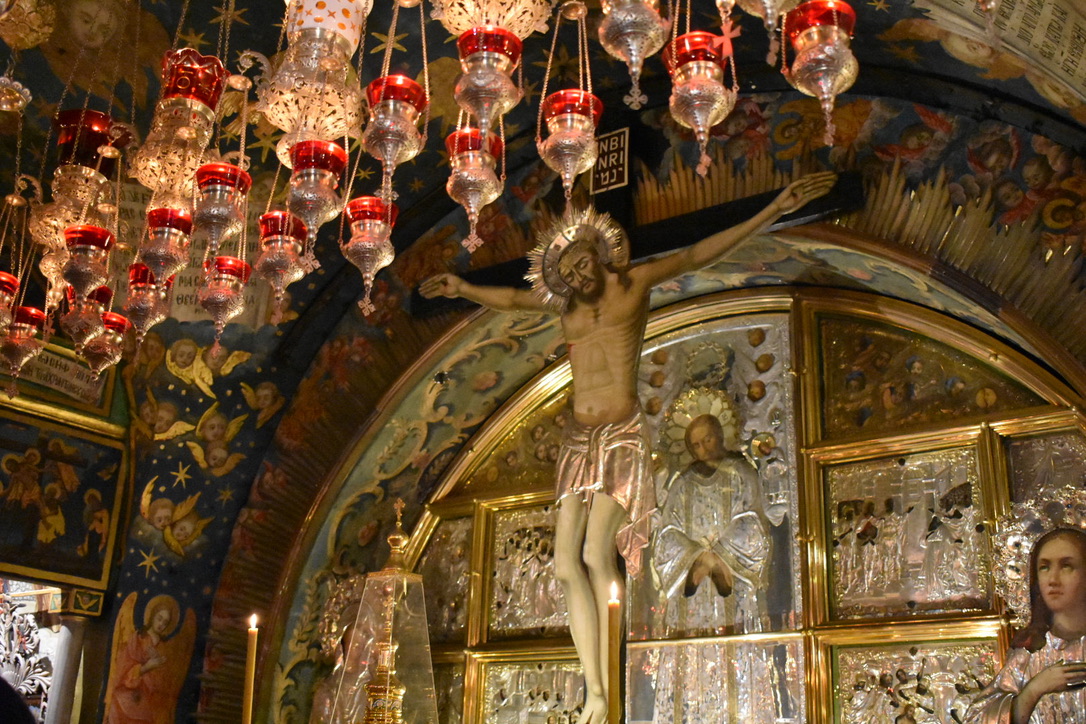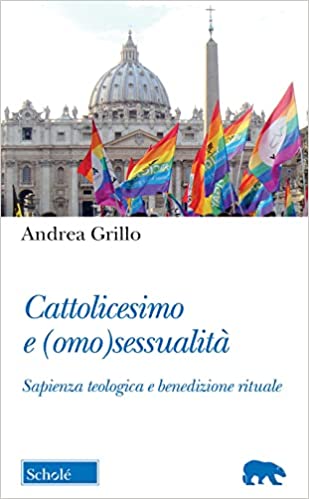Each year, the church invites us into something breathtakingly beautiful and profoundly mysterious: Holy Week, the heart of the Christian story. As a priest, it is one of the most beautiful and powerful weeks of the year. It is not merely a remembrance of ancient events, but a sacred drama that we are called to enter with our whole selves—our stories, wounds, hopes and identities.
To my LGBTQ sisters, brothers, and siblings in Christ, I would like to say: this week is for you. The Sacred Triduum—which includes the liturgies of Holy Thursday and Good Friday, plus the Easter Vigil on Holy Saturday—is not reserved for the seemingly perfect or the pious. It is God’s open-armed welcome to all of us, especially those who have ever felt on the margins. You are not outside the story. You are at its very heart.
Let us walk together through this Holy Week, not as spectators but as participants in the drama of divine love. Let us see what it reveals not only about God but also about who we are and how deeply we are loved. If you’ve never experienced the Triduum, I’d encourage you to find a welcoming parish and participate in the liturgies. If you’re unsure what you’re in for, allow me to explain a bit about what you’ll encounter.
Holy Thursday: Love that bends down
Holy Thursday begins the Sacred Triduum, the three holiest days of the liturgical year. On this night, we remember Jesus’ Last Supper with his disciples, the institution of the Eucharist and the command to love one another.
But there’s something else that happens, something startling: Jesus kneels.
Notice when the priest removes his chasuble and kneels at the feet of his community as he washes the feet of his parishioners.
On that first Holy Thursday, Jesus knelt to wash the feet of his disciples. It was messy, undignified work. Feet carry the dust and grime of daily life. And yet the Son of God fell to his knees with a towel around his waist to gently wash them.
Why?
Because love stoops. Love serves. Love doesn’t stand at a distance—it draws near to what is real and vulnerable and raw.
For many LGBTQ Catholics, the word “church” can bring up painful memories. Perhaps you’ve felt unwelcome, unseen or even shamed. Perhaps your story has been met with silence, your love misunderstood or your dignity questioned. And yet here is Jesus, bending low, taking your feet in his hands.
Jesus sees you. Not as a category or a cause, but as his beloved. He knows the miles you’ve walked. The searching. The heartache. The courage it has taken to claim your identity and your faith. He does not look away. He kneels before you.
The Mass of the Lord’s Supper is an invitation to remember that God is not afraid of your story. The Eucharist is not a reward for the righteous—it is food for the journey, nourishment for the weary. You belong at the table. Not as a guest, but as family.
This night also whispers a call to all of us: “As I have done for you, so you also should do.” We are invited to imitate this love that serves—not out of obligation, but because we have been so loved ourselves.
Good Friday: Love that suffers with us
If Holy Thursday is intimate, Good Friday is stark. The church is bare. The tabernacle is empty. The music is hushed. The decorations are covered or removed. And we remember the crucifixion.
There is no Mass today. No consecration. Instead, we gather to hear the Passion of our Lord, to venerate the cross and to pray for the world.
At my parish in Chicago, where I serve as pastor, our cross stands tall near the front of the church, a visible sign of God’s love in the midst of the passion.
Some ask, “Why such a focus on suffering? Why dwell on something so brutal?”
Because this is not abstract suffering; this is God entering into the very depths of human pain.
On the cross, Jesus cries out the words of Psalm 22: “My God, my God, why have you forsaken me?” He knows what it is to feel abandoned. He knows betrayal, mockery, injustice and violence. He knows what it is to be misunderstood, to be cast out.
If you have ever been excluded from your own family, turned away by your community, or told you are unworthy, know that Christ has stood where you stand. He has borne rejection, humiliation and deep loneliness.
But he does not turn away from suffering—his or ours. He enters into it, fully and freely, so that none of it will ever be wasted. Not one tear, not one heartbreak, not one silent night of wondering if you belong.
The cross reveals not just the cost of love, but its power. It tells us that God has not abandoned us in our darkest moments. He has gone ahead of us into death itself and broken it open from the inside.
When we venerate the cross on Good Friday, we are not only reverencing what Jesus did long ago. We are bringing our crosses—those we’ve carried alone for too long—and placing them in his hands.
There is no pain you bear that he does not carry with you.
Holy Saturday: Love that waits in silence
Holy Saturday is a day unlike any other. Christ lies in the tomb. The world waits. There is no liturgy until the evening. It is a day of silence, stillness and waiting.
For many in the LGBTQ community, Holy Saturday may feel strangely familiar. It is the space between pain and resurrection, between Good Friday and Easter Sunday. It is the space of not yet.
Not yet fully healed. Not yet fully welcomed. Not yet sure where your place is in the Church or in your family. And yet, it is holy.
It teaches us that waiting is not wasted time. In the silence of the tomb, God is still at work. Seeds are breaking open in the dark. The victory is already being prepared.
The ancient tradition of the church calls this day the “harrowing of hell,” when Christ descended to the dead, not to be defeated, but to free the captives. Picture it: Jesus bursting into the darkness, calling by name those who have long waited in chains. He brings light into every corner of human history. No one is forgotten.
You are not forgotten.
In your own moments of “Holy Saturday,” when answers don’t come, when healing takes time, when your place in the church feels uncertain, know that Christ is with you in the waiting, calling to you. The silence is not empty, it is pregnant with hope.
The Easter Vigil: Love that rises
The Easter Vigil begins in darkness. A fire is kindled. A candle is lit. The light of Christ shatters the night.
This is no ordinary Mass. It is the highest, most dazzling liturgy of the year. We hear the ancient Exsultet sung where we “celebrate the work of bees and of your servant’s hands” as we see the light of the Easter candle pervade the darkness of the church. We listen to readings that stretch from creation to resurrection. We witness new members baptized, anointed, and welcomed. We renew our own baptismal vows.
This is our story.
For LGBTQ Catholics who feel that they are only part of the church “on the margins,” the Easter Vigil is a powerful reminder that you are woven into the very heart of salvation history. The same waters that parted for the Israelites, the same tomb that was found empty—that is your inheritance.
You were created in love. You were claimed in baptism. You are risen with Christ.
And what does that resurrection mean? It means death is not the end. Shame is not the final word. Fear does not define you.
The resurrection does not erase the wounds. It transforms them. The Risen Christ still bears the scars. But they shine now. They sing of love that could not be defeated. Ultimately, like we pray in the Exsultet, your life is called to be like “glowing fire ignites for God’s honor, a fire into many flames divided, yet never dimmed by sharing of its light.”
Stepping into the drama
Holy Week is not a play we watch from the pews. It is a mystery we live. If you’ve ever felt like this story wasn’t meant for you, please hear this: You are not only welcome here; you are needed.
The church is not whole without your voice. Your experience, your faith, your questions and your love—they enrich the Body of Christ.
As a priest, I have been privileged to walk with many LGBTQ Catholics. It has enhanced my own ministry walk in holiness. I have seen your faith, often forged in fire. I have witnessed your forgiveness, your generosity and your desire to serve. And I want to say, with all my heart: I’m sorry for the times the church has failed to reflect the love of Christ. And I’m so glad you’re still here.
I pray that this Holy Week will be a time of healing. Let it be a time of remembering who you are in God’s eyes: beloved, chosen, redeemed. Let it be a time of reconnection, with your faith, with your community and with Christ who walks beside you.
Come to the table on Holy Thursday. Come to the foot of the Cross on Good Friday. Come to the silence of Holy Saturday. Come to the fire of Easter Vigil.
Don’t stand back. Enter in.
The drama of Holy Week is not complete without you.




